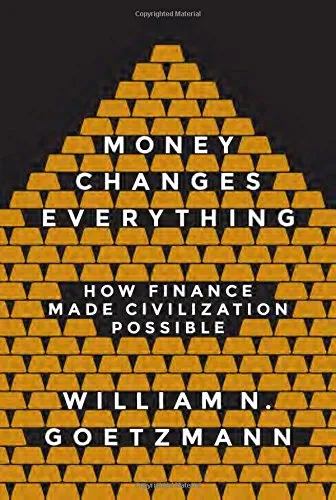Money Changes Everything: How Finance Made Civilization Possible
4.3
Reviews from our users

You Can Ask your questions from this book's AI after Login
Each download or ask from book AI costs 2 points. To earn more free points, please visit the Points Guide Page and complete some valuable actions.Introduction to "Money Changes Everything: How Finance Made Civilization Possible"
Money is often seen as a mundane or even corrupting force in the modern world, but its significance in human history extends far deeper than just powering economies or accumulating wealth. In "Money Changes Everything: How Finance Made Civilization Possible," William N. Goetzmann challenges readers to rethink their perception of money, finance, and their transformative roles in human progress. This book takes readers on an enlightening journey through centuries of innovation, showing how financial concepts have shaped societies, driven technological development, and ultimately made civilization itself possible.
In this groundbreaking work, Goetzmann reveals how finance has not only facilitated trade and commerce but also fostered urbanization, scientific breakthroughs, and even political stability. Through rich storytelling and scholarly rigor, the author explores a wide array of historical events, from ancient Mesopotamia to modern Wall Street, illustrating how the evolution of financial systems mirrors humanity's ability to adapt, innovate, and grow. This is a book not just about economics, but about the very essence of human collaboration and survival.
Detailed Summary of the Book
"Money Changes Everything" traces the origins, development, and impact of financial systems through different eras and civilizations. The book begins with a discussion of ancient Mesopotamia, where the earliest recorded financial transactions were made. Here, Goetzmann introduces the idea that accounting systems, credit, and money were pivotal to the development of large-scale agriculture and urban settlements. Rather than being a mere byproduct of trade, finance was an enabler of structured society.
As the narrative progresses, readers are exposed to a detailed exploration of financial innovation across time. Goetzmann discusses the role of finance in the expansion of empires like Rome, the emergence of trade hubs during the Renaissance, and the financing of risky expeditions during the Age of Exploration. He demonstrates how financial mechanisms such as insurance, bonds, and joint-stock companies allowed people to undertake ventures that were previously impossible due to risk constraints. These functional tools did not merely serve economics—they fundamentally changed how society conceived trust, responsibility, and collaboration.
The book also highlights finance’s darker aspects, from speculative bubbles to systemic inequities. However, Goetzmann is careful to balance the discussion by showcasing its productivity and resilience in driving human achievement. In more contemporary chapters, readers learn about the global financial systems that created the modern world, emphasizing how innovations like securities markets eliminated inefficiencies and spurred progress.
Ultimately, "Money Changes Everything" is an overarching exploration of how finance intersects with culture, technology, and human ambition to create the complex societies in which we live today.
Key Takeaways
- Finance is not merely about money—it is a set of tools and systems designed to solve problems of trust, risk, and resource allocation.
- Accounting and credit systems found in ancient societies were crucial precursors to modern economies.
- Financial innovation has repeatedly enabled leaps in technology, exploration, and societal development.
- While finance has often been associated with inequality and economic crises, it is also a key driver of progress and opportunity across civilizations.
- Understanding the history of finance helps us interpret its role in shaping economies and societies today.
Famous Quotes from the Book
"At its core, finance is a technology of optimism—necessary for risk-taking, progress, and growth."
"From its earliest forms, finance allowed humans to transcend the limits of barter to address larger scale problems of allocation and trust."
"The story of finance and civilization is not separate; they are intertwined and co-dependent."
Why This Book Matters
"Money Changes Everything" is an essential read for anyone wishing to understand not only the history of finance but its profound implications on human progress. William N. Goetzmann presents a compelling argument for why finance is not merely an economic tool but a foundational element of civilization. By exploring the innovations, transformations, and sometimes turbulent episodes that finance has driven, the book provides readers with a greater appreciation of how interconnected our social, technological, and economic systems truly are.
In an age where financial systems are increasingly complex and global in scale, understanding their historical evolution is more critical than ever. Through vivid storytelling, rigorous research, and deeply insightful analysis, Goetzmann equips readers with the knowledge to appreciate finance’s potential and pitfalls alike. Whether you are a historian, economist, or simply a curious reader, this book offers a transformative perspective on the forces that have shaped our shared human journey.
Free Direct Download
Get Free Access to Download this and other Thousands of Books (Join Now)
For read this book you need PDF Reader Software like Foxit Reader
if you can , please get books from this platforms instead of download it!
Find this book on other platforms:
WorldCat helps you find books in libraries worldwide.
See ratings, reviews, and discussions on Goodreads.
Find and buy rare or used books on AbeBooks.


